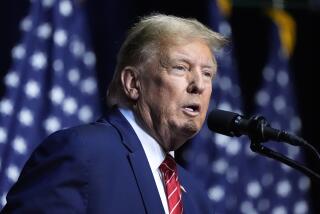Ohio’s GOP primary may be a last chance — to save Kasich, and blunt Trump

From one week to the next, the forces arrayed against Donald Trump have repeatedly suggested one state or another would cut down the Republican presidential front-runner. New Hampshire, South Carolina, Nevada, Michigan. He won them all.
Now the effort to stop — or at least slow —Trump’s march to the GOP nomination has narrowed to Florida and Ohio.
Only one is close.
Polls give Trump, who lives part time in Palm Beach, a sizable lead in Florida, where home-state Sen. Marco Rubio is making a last stand to save his fading candidacy. Texas Sen. Ted Cruz is also campaigning hard in the state, but many in the party find him no more appealing than Trump.
If the Manhattan business mogul is to be denied, it may come down to Ohio and its governor, John Kasich, who is 0-for-24 in contests so far.
He seems an unlikely party savior.
One of the biggest questions when Kasich entered the race last summer was whether he was too abrasive to be elected president.
For many, especially Ohioans long familiar with the governor, his White House campaign has proved a revelation.
There is all the usual conservative talk of lowering taxes and limiting regulations, shrinking the size of government and sending Washington programs back to the states. But there are also sermonettes on love and lightness, on purpose and meaning, and on compassion and caring that seem more suited to a therapy session or self-improvement seminar.
As a crowd of several hundred huddled last weekend against an afternoon chill, Kasich spoke movingly at a rally here of the nurse who stays past her shift to comfort a grieving family, or neighbors who take a lonely widow to dinner, so she can get her hair done and wear a dress she hasn’t put on in months.
“I believe when we work together, we’re a great, beautiful mosaic,” he said. “We need to live a life bigger than ourselves to help heal this world.”
As a congressman in the 1990s, Kasich was a part of the conservative revolution that took over the House. But as Ohio’s governor since 2011, he has angered many Republicans for heresies including support for certain tax hikes and, more egregiously, expanding the state’s healthcare programs under the Affordable Care Act, often called Obamacare.
His prickly persona is well known in Washington and Columbus, the state capital. First elected to the Ohio Legislature in his brash 20s, Kasich — now 63 — has spent decades giving offense; stories abound of the personal insults and indignities suffered by Republican colleagues and others who have brushed up against him.
Whatever caused the transformation, Kasich’s new up-with-people luminosity offers a stark contrast to the slashing, belittling style of Trump, especially in debates, where the governor has refrained from the schoolyard taunts of other candidates.
Zinny Bond was among those who waited in a blocks-long line for the chance to see Kasich alongside actor and former California Gov. Arnold Schwarzenegger, who delivered a late endorsement.
The retired linguistics professor can’t abide Trump.
She cited the last presidential debate when he said he would force soldiers to commit war crimes such as torture to fight terrorism. “He said, ‘Well if I told them to do it, they would do it,’” said Bond, 74, releasing an exasperated sigh. “That’s just not at all a candidate saying what this country stands for. It’s ridiculous.”
The notion that Kasich is “the adult in the room” is one often expressed by supporters.
So far, though, in this incendiary campaign season, that has only been enough to achieve a series of second-, third- and lesser-place finishes.
Now it is down to Florida and Ohio, where losses Tuesday would eliminate both Rubio and Kasich, leaving only Cruz to face Trump.
The Texas senator has won the second-most contests. But Cruz’s hard-edged conservatism limits his appeal beyond all but the most ideological Republicans, a problem as the race moves to states with a more moderate lean, like Maryland, New Jersey and California.
There are a lot of people who feel disenfranchised and feel like indentured servants to a government that just doesn’t care about them anymore.
— Bob Ney, former Ohio congressman
That is why Kasich hopes to emerge as the establishment favorite. A victory in winner-take-all Ohio, with 66 delegates, would more than double his total and, strategists hope, position him for a strong run in the big states that follow.
“We have an election where 50% of the delegates have been selected and 50% have not been selected,” Kasich said Wednesday at a campaign stop in Illinois, which also votes Tuesday. “And in those states that have not yet selected delegates, basically … Donald Trump, Ted Cruz and I are dead even.”
It takes 1,237 delegates to claim the nomination ahead of this summer’s GOP convention. Trump has 458 after winning 15 states. The aim of Kasich and others opposing him is to stop Trump short of the number he needs to clinch the nomination and wrestle it away at a contested convention held, as its happens, in Cleveland.
Kasich enjoys considerable advantages here at home, not least the fact he is fighting on familiar ground.
The Ohio Republican Party has thrown its full weight behind Kasich; the party chairman organized an anti-Trump conference call with reporters when the reality TV star touched down this month for a rally at Columbus airport, drawing a crowd of several thousand.
A political action committee working on Kasich’s behalf is running more than $1 million in TV ads and has set up a network of phone banks, targeting voters as if it were a race for governor or state attorney general.
For all of that, however, the race remains highly competitive, with polls giving Trump a modest lead.
The same roiling mix of anger, frustration and disgust with politics that has powered his rise elsewhere is very much in evidence in Ohio, especially in Rust Belt communities whose best days are part of a long-ago past.
“There are a lot of people who feel disenfranchised and feel like indentured servants to a government that just doesn’t care about them anymore,” said Bob Ney, who represented portions of Appalachian Ohio in Congress for 11 years. He is neutral in the primary.
Even some Kasich supporters find things they like about Trump.
“He’s a brilliant businessman, there’s no doubt about that,” said Mark Wirt, 52, who drove an hour and stood first in line to see Kasich and Schwarzenegger. He would have no problem supporting Trump as the nominee, the airline dispatcher said, and sees no reason for Republicans to panic.
David Russell, standing next in line, said his dream ticket would be some combination of Trump and Ohio’s governor.
“I think he would make an amazing vice president,” the 50-year-old event planner said of Kasich, “and, hopefully down the road, he’d make a great president if it turns out this is not his time.”
Twitter: @markzbarabak
MORE ON CAMPAIGN 2016
‘What do you want in your next president?
With Florida just days away, Rubio is all in, but some donors say he should quit now
Tough debate questions, especially for Clinton, after her surprise loss to Sanders in Michigan
Updates from the campaign trail
More to Read
Get the L.A. Times Politics newsletter
Deeply reported insights into legislation, politics and policy from Sacramento, Washington and beyond. In your inbox three times per week.
You may occasionally receive promotional content from the Los Angeles Times.







